人教版(2019)新教材高中英语选择性必修第二册Unit 2 Bridging Cultures词汇课件(131张PPT)
文档属性
| 名称 | 人教版(2019)新教材高中英语选择性必修第二册Unit 2 Bridging Cultures词汇课件(131张PPT) |  | |
| 格式 | pptx | ||
| 文件大小 | 2.2MB | ||
| 资源类型 | 教案 | ||
| 版本资源 | 人教版(2019) | ||
| 科目 | 英语 | ||
| 更新时间 | 2021-04-24 16:26:20 | ||
图片预览

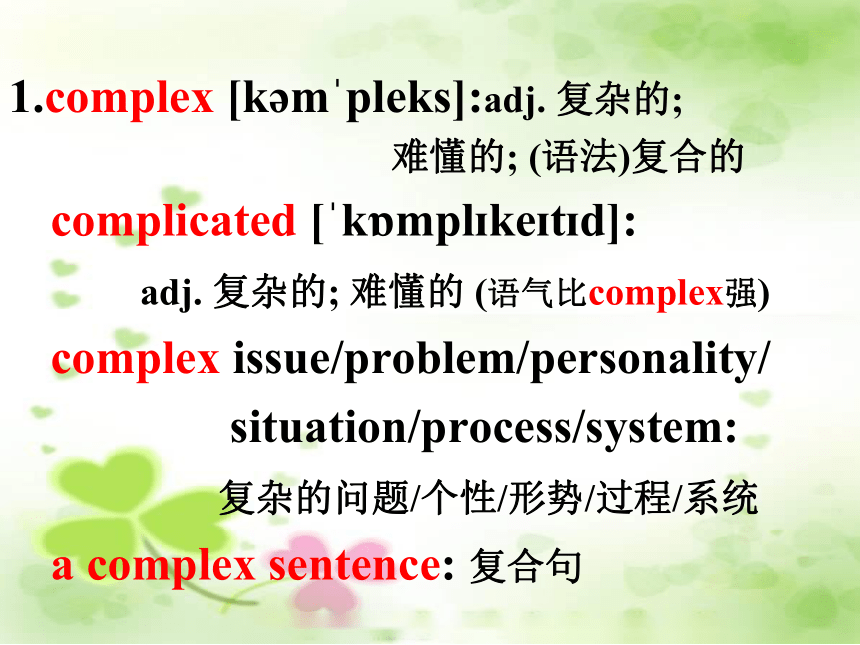
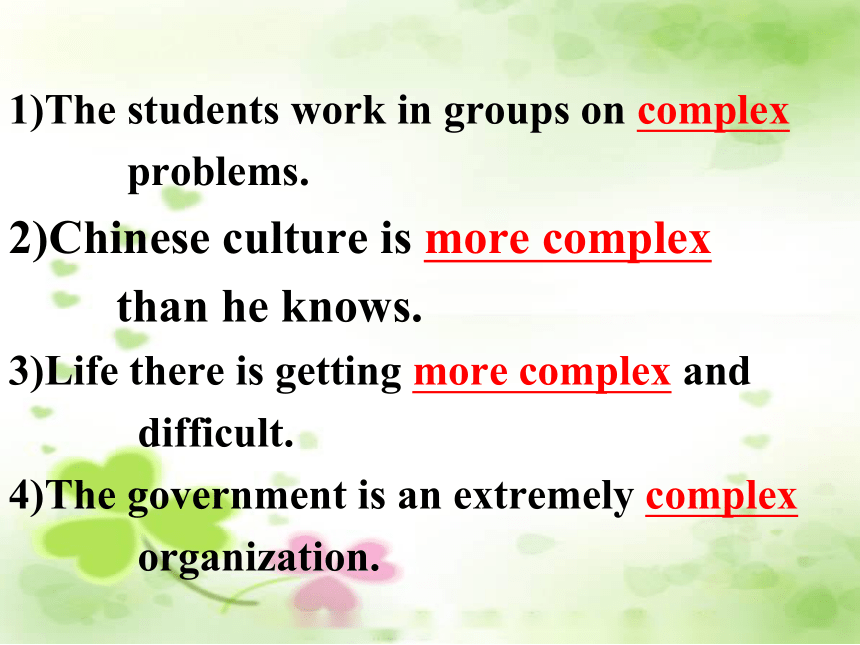
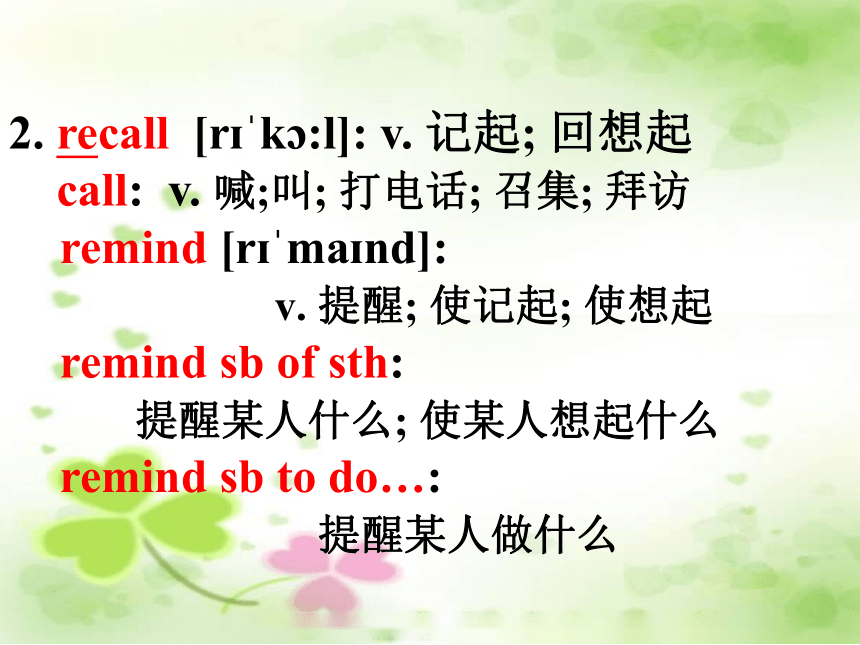

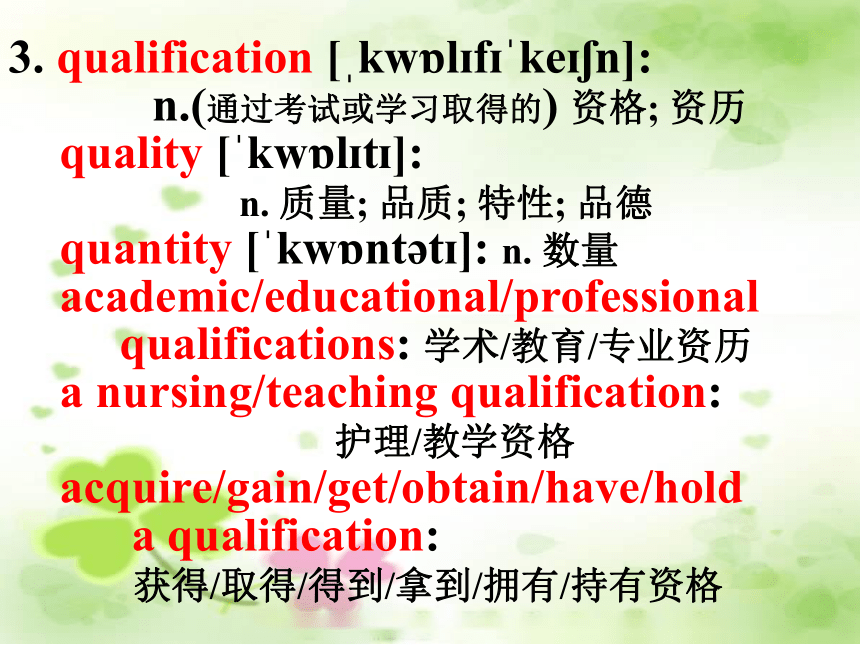

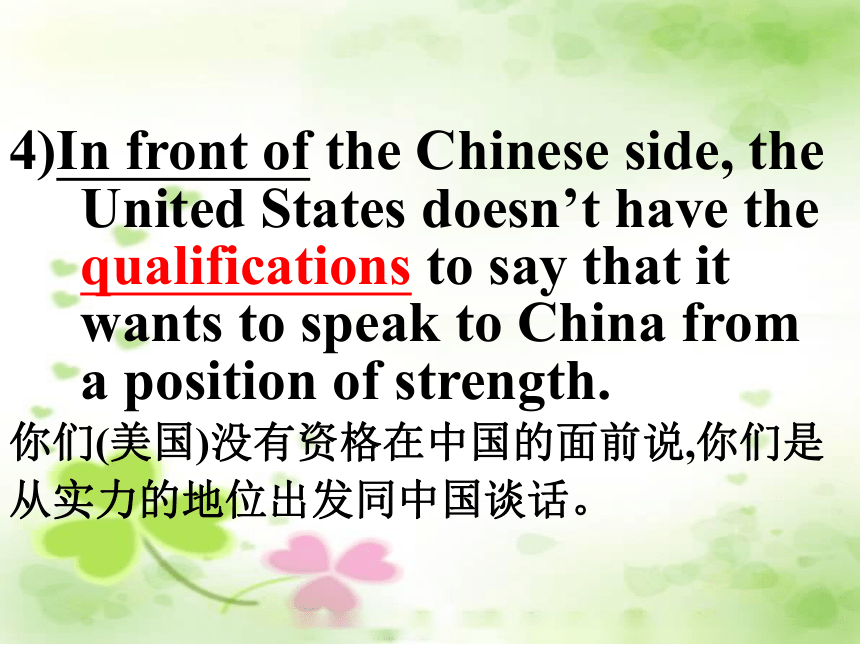
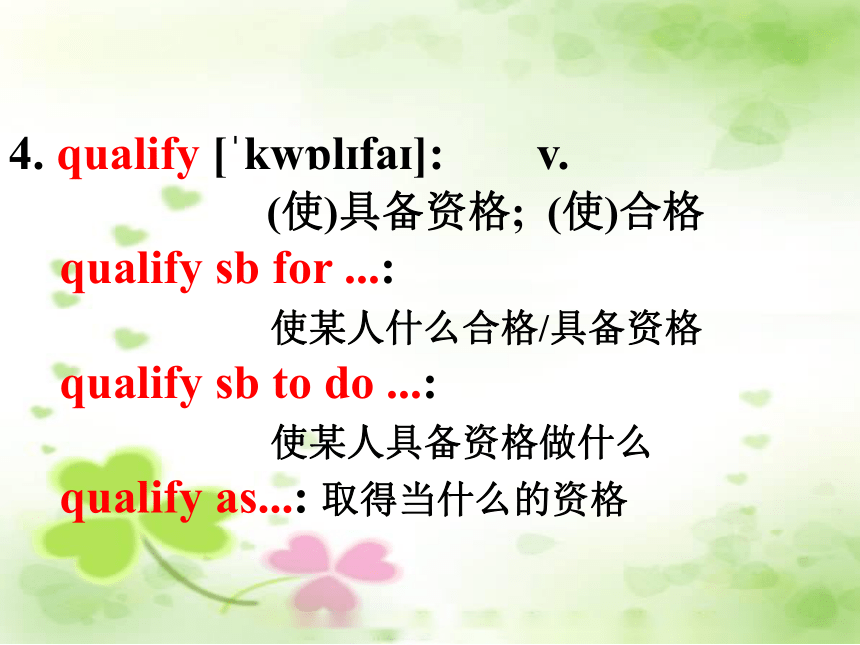

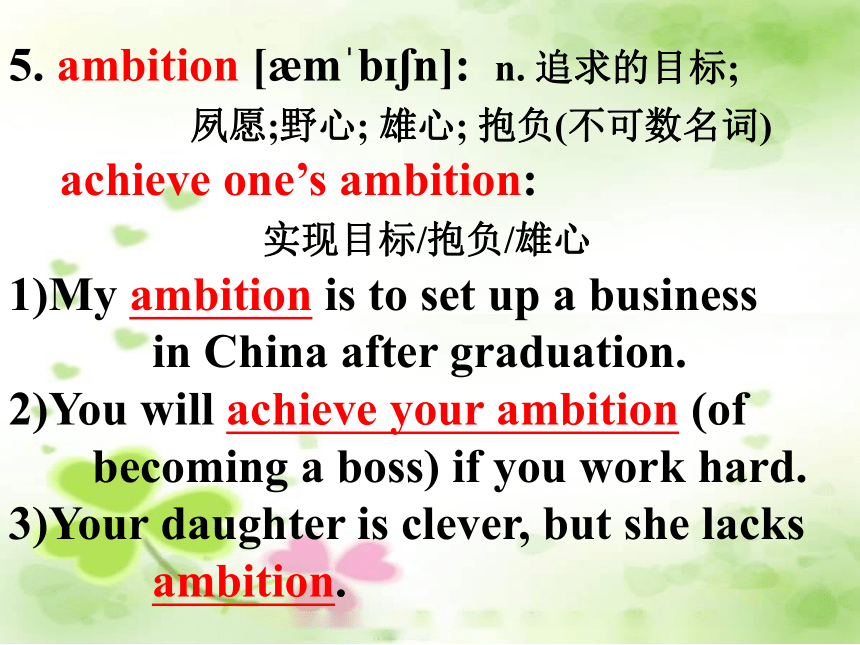
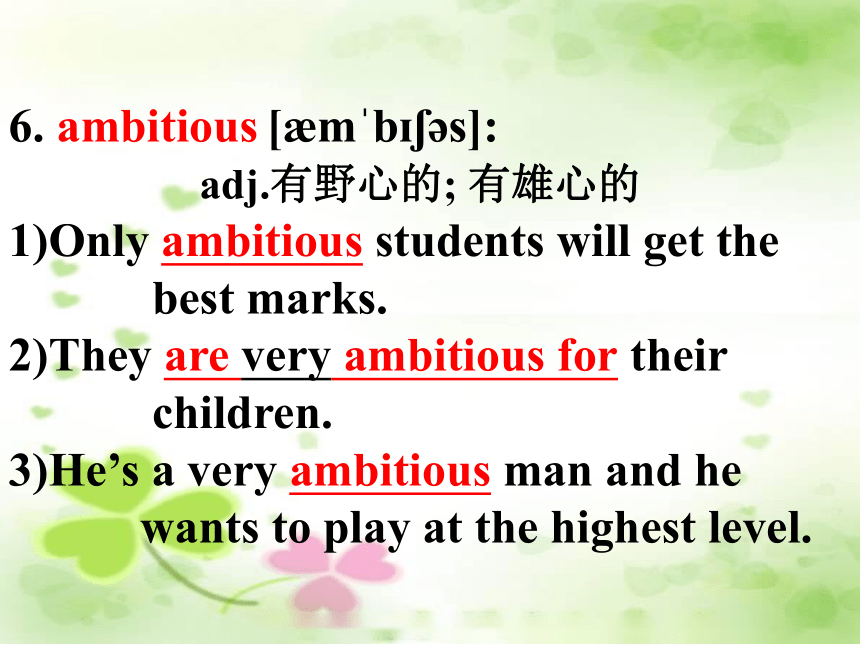
文档简介
(共131张PPT)
人教版(2019)新教材高中英语选择性必修第二册
Unit 2
Bridging Cultures
Words and Expressions
1.complex [k m pleks]:adj. 复杂的;
难懂的; (语法)复合的
complicated [ k mpl ke t d]:
adj. 复杂的; 难懂的 (语气比complex强)
complex issue/problem/personality/
situation/process/system:
复杂的问题/个性/形势/过程/系统
a complex sentence: 复合句
1)The students work in groups on complex
problems.
2)Chinese culture is more complex
than he knows.
3)Life there is getting more complex and
difficult.
4)The government is an extremely complex
organization.
2. recall [r k :l]: v. 记起; 回想起
call: v. 喊;叫; 打电话; 召集; 拜访
remind [r ma nd]:
v. 提醒; 使记起; 使想起
remind sb of sth:
提醒某人什么; 使某人想起什么
remind sb to do…:
提醒某人做什么
1)“I was very excited but also quite
nervous. I didn’t know what to
expect,” Xie Lei recalled.
2)I know his face but I can’t recall his
name.
3)He recalled that she always came
home late on Wednesdays.
3. qualification [ kw l f ke n]:
n.(通过考试或学习取得的) 资格; 资历
quality [ kw l t ]:
n. 质量; 品质; 特性; 品德
quantity [ kw nt t ]: n. 数量
academic/educational/professional
qualifications: 学术/教育/专业资历
a nursing/teaching qualification:
护理/教学资格
acquire/gain/get/obtain/have/hold
a qualification:
获得/取得/得到/拿到/拥有/持有资格
1)Xie Lei is studying for a business
qualification at a university in China
and has come to our university on a
year-long exchange programme.
2)Salary will be determined according
to your working experience and
qualification.
3)Previous teaching experience is a
necessary qualification for this job.
4)In front of the Chinese side, the
United States doesn’t have the
qualifications to say that it
wants to speak to China from
a position of strength.
你们(美国)没有资格在中国的面前说,你们是从实力的地位出发同中国谈话。
4. qualify [ kw l fa ]: v.
(使)具备资格; (使)合格
qualify sb for ...:
使某人什么合格/具备资格
qualify sb to do ...:
使某人具备资格做什么
qualify as...: 取得当什么的资格
1)His skills qualify him for the job.
2)I believe my major and experiences
will qualify me for the job.
3)A degree in English does not qualify
you to teach English.
4)His son qualified as a doctor last year.
5. ambition [ m b n]: n. 追求的目标;
夙愿;野心; 雄心; 抱负(不可数名词)
achieve one’s ambition:
实现目标/抱负/雄心
1)My ambition is to set up a business
in China after graduation.
2)You will achieve your ambition (of
becoming a boss) if you work hard.
3)Your daughter is clever, but she lacks
ambition.
6. ambitious [ m b s]:
adj.有野心的; 有雄心的
1)Only ambitious students will get the
best marks.
2)They are very ambitious for their
children.
3)He’s a very ambitious man and he
wants to play at the highest level.
7. adaptation [ d p te n]:
n.适应; 改编本
adapt [ d pt]: v. 适应; 改编; 改写
adopt [ d pt]:
v. 采纳; 收养; 通过; 批准
adapt/adjust (oneself) to…: 适应
1)Although some foreign students live
in campus accommodation, Xie Lei
chose to live with a host family
(寄宿家庭), who can help with her
adaptation to the new culture.
2)He made a quick adaptation to the
new environment.
3)Do you think the film adaptation was
faithful to the book
8. comfort [ k mf t]: n.安慰; 舒服; 安逸
令人感到安慰的人或者事物
v. 安慰; 抚慰
comfortable [ k mf t bl]: adj.舒适的;
(使人)舒服的; 愉快放松的; 安逸的
comfortably: adv. 舒服地; 舒适地;
安逸地; 容易地
in comfort: 舒适地
1)When I miss home, I feel comforted
to have a second family.
2)She took the child in her arms and
tried to comfort him.
3)The hotel offers a high standard of
comfort and service.
4)The children have been a great comfort
to me in the past 5 years.
tutor
9. tutor [ tju t (r)] [ tu t ]: n.
(英国大学中的)助教; 导师; 家庭教师
teacher : n. 老师; 教师
educator ['edju:keit /'ed u:keit ]:
n. 教育者; 教师
1)Her tutor advised her to read lots of
information in order to form a
wise opinion of her own.
2)His parents employed a tutor to
teach him maths/math.
3)Her tutor says she is making good/
great/rapid progress.
10. cite [sa t]: v. 引用; 引述 (正式用词)
quote: v. 引用; 引述
1)The first time that she had to write an
essay, her tutor explained that she must
acknowledge what other people had
said if she cited their ideas.
2)I’d like to cite my own experience
as an example.
3)She cited a favourite poem by Li Bai.
4)He will cite only one example.
11. participation [pɑ t s pe n]:
n. 参加; 参与
1)Xie Lei also found many courses
included students’ participation in
class as part of the final result.
2)Your participation will contribute a
lot to our success.
3)Without global participation,
no solution is likely to work.
12. participate [pɑ t s pe t]: v. 参加; 参与
13. participate in...: 参加; 参与 (正式用词)
take part in...≈ join in...:
参加; 参与 (普通用词)
join: v. 参加 (通常指参加某组织或团体)
attend: v. 参加; 出席
(正式用语。一般指参加会议、出席典礼或招待会等,
也可以指上学、听课、听演讲或讲座等)
1)Kate can’t participate in the match
because she has hurt her foot.
2)Yesterday the headmaster didn’t
participate in the discussion.
3)The girls in his class are willing to
participate in the dancing party.
4)Over 2,000 students in the school
participate in sports/the contest.
14. presentation [ prezn te n]:
n. 报告; 陈述; 出示; 拿出;
展示会; 介绍会; 发布会
present: v. 颁发; 提出; 提交; 展现;显示; 表现
1)Students need to generate(产生) ideas,
offer examples, apply concepts,
and raise questions, as well as
give presentations.
2)My presentation on traditional
Chinese art was a great success,
which boosted(增强) my confidence.
3)Admission(入场费) is free on presentation
of this card.
4)Our company will give a presentation
on our new cars.
15. speak up: 大声点说; 明确表态
speak of: 谈到
speak out: 大胆说出
speak to/with...: 和...谈话
1)At first, Xie Lei had no idea what she
should say, but what surprised her
was that she found herself speaking
up in class after just a few weeks.
2)I’m quite deaf --- you will have to
speak up.
3)Please speak up so that the people at
the back of the room can hear you.
16. feel at home: 舒服自在; 不拘束
feel more at home:
更无拘无束; 更舒适自在
1)Now halfway through her exchange
year, Xie Lei feels much more at
home in the UK.
2)People from all over the world feel
at home in Hong Kong.
3)Good hotel service will make guests
feel at home.
17. engage [ n ge d ]: v. 参加;
参与(活动); 吸引(注意力/兴趣)
1)They never learned skills to engage
the attention of the others.
2)His attention was engaged by the
new posters on the wall.
18. engage in...: (使)从事; 参与
≈ take part in...
engage sb in...: 使某人加入/参加
be engaged to sb: 与...订婚
be married to sb: 与...结婚
1)Engaging in British culture has helped.
2)Her father has never engaged in the
drug trade.
3)Nowadays, office workers rarely
engage in regular exercise.
4)Students are given the opportunity to
engage in the discussions/contest.
5)His mother engages in the study of
classical music.
6)Just now we engaged him in
conversation.
19. involve [ n v lv]: v. 包含; 需要;
涉及; 影响; (使)参加
involve sb in sth/doing...:
使某人参加/参与
contain: v. 包含
include : v. 包括; 包含
including: prep. 包括; 包含
1)The test will involve reading a piece
of news.
2)She didn’t realize writing a report
involved so much work.
3)Many of the crimes involved drugs.
4)These changes will involve/affect/
influence everyone at the factory.
5)Parents should involve themselves in
their children’s education.
20. get involved in...:
参与; 卷入; 与...有关联
1)As well as studying hard, I’ve been
involved in social activities.
2)Just walk around and don’t get
involved in any quarrels.
3)You had better not get involved in
politics.
4)Can I get involved in this program
when you get here
21. messenger [ mes nd (r)] :
n. 送信人; 信使
message [ mes d ]:
n. 消息; 信息; 口信
passenger [ p s nd ]: n. 乘客; 旅客
passage [ p s d ]:n. 通道; 走廊;
段落; 旅费; 船票
1)While I’m learning about business,
I’m also acting as a cultural
messenger building a bridge
between us.
2)I’ll order a special messenger to
deliver the document.
3)By the time the messenger reached
him, the damage had been done.
22. edition [ d n]: n. (报纸/杂志的)一份;
(广播/电视节目)一期;一辑; 版次
editor [ ed t ]: n. 编辑
edit [ ed t]: v. 编辑; 剪辑
a paperback/hardback edition:
平装/精装本
1)We will follow Xie Lei’s progress in
later editions, but for now we wish
her all the best.
2)Many new words and phrases have
been included in the revised
edition(修订版).
3)The English-Chinese dictionary is
now in its ninth edition.
23. culture shock: 文化冲击
文化冲击主要是来自于两个不同文化差异而引起。可以发生在任何时候,任何新环境。当你到达一个地方觉得很陌生、很困惑,不知道自己的角色是什么、应定位在哪里?应怎么表现才恰当等等,觉得很不舒服、很不自在。文化冲击会引起身体上的一些症状: 如头痛、胃囗不好、睡眠失调或者心理上的焦虑、沮丧等。
1)Adam, recently arrived in Paris, is
jobless, homeless, friendless, and
suffering from culture shock.
2)Culture shock is one of the common
experiences by students abroad.
3)The first time you go abroad, you
may experience a culture shock.
4)You’ll overcome the culture shock
in no time.
24. zone [z n]: n.(有别于周围的)地区;
地带; 区域
region [ ri d n]: n. 地区; 区域
district: n. 地区; 行政区
area [ e ri ]: n. 地区; 区域
an earthquake/a danger/a safe zone:
地震带/危险地带/安全区
Shenzhen Special Economic Zone:
深圳经济特区
1)The area has been declared a disaster
zone.
2)Many people have stayed behind in
the potential war zone.
3)They are pulling their troops out of
the battle zone.
fort zone: 舒适区; 舒适范围
1)Walk out of our comfort zone and
try new things!
2)In order to grow, you must step out
of your comfort zone.
3)I think that studying for an MBA
(工商管理硕士)forces you outside your
comfort zone.
26. overwhelming [ v welm ]:
adj. 无法抗拒的; 巨大的; 压倒性的
1)However, hardly anyone speaks English
in my area, so it can be a bit
overwhelming at times.
2)The evidence against him was
overwhelming.
3)You may find it somewhat
overwhelming at first.
4)She feels/has an overwhelming
desire to have another child.
27. homesickness ['h ms kn s] :
n. 思乡病; 乡愁
homesick: adj. 思乡的; 想家的
1)When I was a child, my homesickness
was a small stamp.
2)Later, homesickness was a low tomb, I
stood outside, and my mother lay inside.
3)Laughter was another medicine to cure
my depression and homesickness.
4)A letter from home set off an attack
of homesickness.
28. motivated [ m t ve t d]:
adj. 积极的; 主动的
active [ kt v]:
adj. 活跃的; 积极的; 主动的
positive [ p z tiv]:adj. 积极的;
良好的; 有益的; 肯定的;
正面的;阳性的
1)Andrew is a highly motivated student.
2)I am working with mostly highly
motivated people.
3)More than that, how should you stay
motivated to achieve the goal
29. motivation [ m t ve n]:
n. 动力; 积极性; 动机
determination: n. 决心; 坚定
1)Most people said that pay was their
main motivation for working.
2)He’s clever enough but he lacks
motivation.
3)What is the motivation behind this
sudden change
4)Not every child has an equal talent or
or an equal motivation.
30. motivate [ m t ve t]:
v. 成为...的动机; 激发; 激励
motivate sb to do...:
激励某人做什么
inspire/encourage sb to do...:
激励/鼓励某人做什么
1)The only way that you can motivate
people is to communicate with them.
2)Does money actually motivate
people at their work
3)The headteacher is very good at
motivating his students.
4)Sometimes daydreams can motivate
people to work harder.
31. advisor/adviser [ d va z ]: n. 顾问
advise [ d va z]: v. 建议; 劝告
(a piece of ) advice [ d va s]:
n. 建议; 劝告; 忠告
1)They employed me as an advisor.
2)From 1943 to 1948, Mr Hill was
an advisor to the president.
3)My parents want me to get the degree,
but my advisor thinks it’s time for
me to get more work experience.
32. reasonable [ ri zn bl]: adj. 有道理的;
合情理的; 相当好的; 不错的;
公平的;可接受的
It is reasonable (for...) to do...:
(某人)做什么是合情合理的。
reason [ ri zn]: n. 原因; 理由; 借口
reasonably: adv. 合符逻辑地; 尚可地;
过得去地; 明智地; 通情达理地
【terrible -- terribly simple -- simply
gentle -- gently】
1)The rent is reasonable, and moreover,
the location is perfect.
2)The boy answered him in reasonable
French.
3)It’s reasonable for those countries
to raise oil prices.
4)It is reasonable for us to expect a
brighter future.
33. expectation [ ekspek te n]:
n. 期望; 预期; 期待
expect [ k spekt]: v. 希望; 期望;认为
beyond one’s expectation:
超出预期;出乎预料
1)The advisor talked about maintaining
reasonable expectations when
studying abroad.
2)She went to college with great
expectations.
3)What he said was really beyond all
my expectation.
34. applicant [ pl k nt]: n.申请人
application [ pl ke n]:
n. 申请(书/表); 应用
apply [ pla ]: v. 申请; 运用; 贴; 凃; 搽
apply for...: 申请
apply to...: 运用; 适合
apply... to...: 给...涂/敷...
1)He is the hundredth applicant for the
job/position.
2)She is the best applicant for the job.
3)An applicant is filling out a job
application.
35. firm[f :m]: adj. 结实的; 牢固的;坚定的
n. 公司;商行; 事务所
firmly: adv. 坚定地; 坚固地
company [ k mp n ]: n. 公司; 陪伴
keep sb company: 陪伴某人
1)Who will be the successful applicant
for the summer job at the law firm
2)The larger firm is capable of
providing better services.
3)We have been able to keep firm
friendships with them.
4)We must maintain a firm attitude.
5)The runner has firm muscles.
36. exposure [ k sp ]:
n. 接触; 体验; 暴露; 揭露
1)Continuous exposure to the sun
could be harmful.
2)The newspaper’s exposure of their
crimes led to their arrest(逮捕).
37. expose [ k sp z]: v.使接触; 使体验;
显露; 使暴露于(险境)
expose sb to sth. : 使某人接触/曝光…
be exposed to ... : 接触…
1)The vice president exposed the true
aims of all their wars.
2)The reporter tried to expose the
plot(阴谋).
3)A wise mother will never expose her
children to such things/art.
4)We should allow children to be
exposed to new ideas.
38. insight [ nsa t]: n. 洞察力; 眼光
sight [sa t]: n. 视力; 看见;
名胜; 景色; 情景
have insight into...: 对...有洞察力
1)Exposure to another culture and its
people can give exchange students
great insights into the world.
2)Good teachers have insight into the
problems of students.
3)He has the insight to recognize their
talents.
4)Children can sometimes show quite
remarkable insight.
39. departure [d pa:t ]:
n. 离开; 启程; 出发
depart 【(from) + 地方)】: v. 离开; 出发
arrivals and departures :
到站和离站班次
set out/off (for...): 出发; 上路; 动身
1)He has made great friends here---
friends that he will still remember
long after his departure.
2)Within 60 minutes the ship was ready
for departure.
3)Everyone was a bit puzzled by her
sudden departure.
4)We have received no news of him
since his departure from the island.
5)The train will depart (from) Shanghai
at 7:30 am.
40. setting [ set ]: n. 环境; 背景;
(小说等的)情节背景
setting: n. (事情发生或所处的)环境; 背景
situation: n. 情况; 形势; 局面
background: n. 背景; 出身
surroundings: n. (周围的)环境
environment:
n. (影响人或事物的行为或发展的)环境
1)We want to have a conference in a
better setting.
2)The island is the perfect setting for a
wonderful Christmas/holiday.
3)Their house is in a lovely setting in
the mountain.
4)The author wrote a short story with
the setting in the countryside.
41. grasp [gra:sp]: v. 理解; 领会; 抓紧
understand: v. 理解; 领会; 了解
master: v. 精通; 掌握; 控制
1)I suppose it was diffcult to grasp the
tones at first.
2)They failed to grasp the importance
of his words.
3)I grasped the opportunity to work abroad.
4)She can’t grasp the basic concepts of
maths.
5)Grasp my hand and I’ll pull you over
the fence.
42. dramatic [dr m t k]: adj. 巨大的;
突然的;急剧的; 喜剧(般)的
romantic [r m nt k]: adj. 浪漫的
n. 浪漫的人
1)The announcement will have a
dramatic effect on house prices.
2)That small country has experienced
dramatic changes in recent years.
3)Over the past few years, we have
made dramatic breakthroughs.
43. expense [ k spens]: n. 费用;花费;开销
expensive [ k spens v]: adj. 昂贵的
cheap: adj. 便宜的
at one’s expense: 由某人付钱;
由某人负担费用; 在某人受损的情况下
at one’s own expense: 自费
at the expense of sb/sth:
以牺牲/损害...的情况下
extra/business/medical expense:
额外的开支/业务开支/医疗费
1)The results are well worth the expense.
2)Running a car is a big expense.
(run: 拥有并使用)
3)You should record all your expenses
during your trip.
4)Yesterday we were taken out for a
meal at the school’s expense.
44. cost (sb) an arm and a leg:
(使)花一大笔钱
1)Tuition fees and living expenses are
much more expensive than at home
and could end up costing most
families an arm and a leg.
2)This trip/cellphone cost me an arm
and a leg.
3)Eating in the restaurants on this
street will cost you an arm and a leg.
45. tremendous [tr mend s]:
adj. 巨大的; 极大地
giant ['d a nt]: adj. 巨大的;伟大的
big: adj. 大的;巨大的; 年龄较大的;
重大的; 严重的
huge: adj. 巨大的;庞大的
large: adj. 大的; 大量的; 大规模的
great: adj. 伟大的: 巨大的; 极大的; 大的
little: adj.小的; 可爱的; 年幼的
small: adj.小的; 小号的;小型的
tiny [ ta ni]: adj. 极小的; 微小的
1)Another important factor to consider
is the tremendous pressure that
comes with studying abroad.
2)Tremendous/Big/Great changes have
taken place in China in the past
40 years.
3)The plane took off with a tremendous
noise.
46. behave [b he v]: v. 表现; 表现得体;
有礼貌 (behaved)
behaviour/behavior[b `he vj ]:
n. 行为; 举止; 表现; 态度
behave well/badly: 表现好/差
well-behaved /badly-behaved student:
表现好/差的学生
It is good/bad manners to do…:
做...是有/无礼貌。
1)They behaved very badly/well
towards their guests.
2)He behaved like a true gentleman.
3)She behaved as if/though nothing
had happened.
4)To be fair, the boy behaved better
than we had expected.
47. surroundings [s ra nd z]:
n. 环境; 周围的事物
surround: v. 包围; 环绕
surrounding: adj. 周围的; 附近的
1)Some may struggle and suffer from
culture shock when learning how
to behave in new surroundings.
2)The teachers work in pleasant
surroundings.
3)She switched on the light and
examined her surroundings.
4)You must adapt/adjust to the new
surroundings as soon as possible.
48. surrounding [s ra nd ]:
adj. 周围的; 附近的
1)The farm and surrounding villages
were flooded.
2)We have searched the surrounding
streets for the missing girl.
3)Small towns in West China serve as
economic and cultural centres
for the surrounding villages.
49. mature [m 't (r)] [m tj (r)]:
adj. 成熟的
【(人/动物性) 成熟; (树) 成熟;
(艺术家等的技艺/能力等)成熟的】
ripe: adj. (水果/谷物/蔬菜等)成熟的;
(时机)成熟
1)Jane is very mature for her age.
2)I’ll let you have an answer after
mature consideration.
3)Our relationship was as close as ever,
but she was changing, growing
into a mature young woman
with her own opinions and
interests.
50. depressed [d prest]:
adj. 沮丧的; 意志消沉的
depress: v. 使抑郁/沮丧/消沉;
使失去信心
depressing: adj. 令人抑郁的;
令人沮丧的; 令人消沉的
depression: n. 抑郁症; 忧郁; 抑郁;
沮丧; 经济衰退
1)Other students are not mature enough
to handle the challenges by
themselves and may become
depressed.
2)She felt very depressed about the future.
3)The more he thought about it,
the more depressed he became.
51. depress [d pres]: v. 使沮丧; 使忧愁
1)Rainy weather always depresses me.
2)The news depressed the composer.
3)The composer felt depressed about
the news.
4)The news was depressing.
52. boom [bu m]: v./n. 迅速发展; 繁荣
1)In the world only China is booming now.
2)Since last year, the agriculture in
this village has boomed.
3)At present, we are witnessing another
building boom.
4)Japan enjoyed a real economic boom
after the Second World War.
53. strengthen [ stre θn]: v.加强; 增强; 巩固
strong: adj. 强壮的; 强大的; 影响大的
strength: n. 力量; 体力; 优势; 优点
long -- length -- lengthen
1)They have great facilities and outstanding
professors, helping to educate young
people who will contribute to the
economy and further strengthen our
country.
2) All in all, studying abroad helps to build
character and increase people’s
understanding of cultural diversity
while strengthening China and
building a shared future for all.
3)The exercises are designed to strengthen
your stomach muscles.
4)Repairs are necessary to strengthen
the bridge.
5)Our friendship has been strengthened.
54. deny [d na ]: v. 否认; 否定; 拒绝
deny doing…: 否认做…
There is no denying that…: 无可否认…
refuse: v. 拒绝; 回绝 (普通用词)
(refuse to do...)
reject : v. 拒绝; 抛弃; 不接受;不录用
1)To sum up, one cannot deny the fact that
studying abroad has its disadvantages, so
when you think about studying abroad
you should consider these many factors.
2)Yesterday she denied charges of theft.
3)He denies attempting to murder his wife.
4)There’s no denying (the fact) that your
quick action saved the old man.
5)She denied that she had taken my money.
55. optimistic [ pt m st k]: adj. 乐观的
pessimistic [ pes m st k]: adj. 悲观的
1)As I always tell my son, there are no
great difficulties for a person who
is brave, optimistic, and willing to
work hard!
2)She is not optimistic about the future.
3)We are now taking a more optimistic
view.
56. gain [ge n]: v. 获得; 赢得;取得;增加
n. 好处; 增加
put on/gain weight: 长胖
take off/lose weight: 减肥
acquire: v. 获得; 取得
attain: v. 得到; 获得 (正式用词)
get: v. 得到; 获得 (普通用词)
1)The education you gain and the
experiences you have will change
you for the better.
2)The country gained its independence 15
years ago.
3)Some people do gain weight after they
stop smoking.
4)Regular exercise helps prevent weight gain.
5)No pains, no gains. 不劳则无获。
57. perspective [p spekt v]:
n. (思考问题的)角度; 观点
from one’s perspective
= from the perspective of sb:
从某人的角度看
in one’s view: 依某人的看法
in one’s opinion: 依某人的看法/观点
from one’s point of view: 在某人看来
1)You should try to see the issue from
a different perspective .
2)The death of his father has given
him a new perspective on life.
petence [ k mp t ns]:
n. 能力; 胜任; 本领
ability [ b l t ]: n. 能力 (普通用词)
talent [ t l nt]: n. 能力; 天才; 天赋
1)Studying abroad also helps you to
gain a global perspective and improve
your general competence.
2)We know her competence in solving
problems.
3)I have doubt about his competence
in teaching.
petent [ k mp t nt]:
adj. 有能力的; 称职的
capable [ ke p bl]: adj. 有能力; 有才能
able: adj. 能够的; 有才能的; 称职的
be able/competent to do...:
有能力做什么; 能做什么
be capable of doing...:
有能力做什么; 能做什么
1)Therefore, China needs more talented
young people with a global perspective
who are highly competent with languages,
have leadership and organisational skills,
and have strong cultural awareness.
2)He’s very competent in his work.
3)I am confident I can be a competent/
an able teacher.
4)Paul is the most competent/the ablest
person in our firm.
60. envoy [ env ]:
n. 使者;使节; (谈判等的)代表
messenger [ mes nd (r)] :
n. 送信人; 信使
envy: [ envi]: n./v. 羡慕; 忌妒
1)Chinese students can be seen as
cultural envoy promoting friendship
between nations.
2)He sent David as his personal envoy
to discuss ways to mend relations
between the two countries.
3)The president’s special envoy visited
several countries to discuss the plan.
61. cooperate [k p re t]:
v. 合作;协作;配合
co-: 一种构词法。共同; 一起
operate [ p re t]:
v. 操作; 使用; 动手术; 运转
operate on/upon...: 给...动手术
1)The two groups/countries agreed to
cooperate with each other.
2)They refused to cooperate with an
American company.
3)She agreed to cooperate with the
police investigation.
4)I hope you can cooperate on this matter.
62. angle [ gl]: n. 角; 角度; 立场
from... angle: 从...的角度
anger [ ɡ ]: n. 气愤; 怒火; 怒气
angel [ e nd l]: n. 天使
eager : adj. 渴望的; 热切 的
eagle[ i ɡl]: n. 雕
hawk [h k]: n. 鹰
1)Cooperating with people from diverse
cultural backgrounds helps us view the
world from different angles and thus
gives us more insight into our own
culture.
2)The photo was taken from an unusual
angle.
3)The boss was considering the idea
from all angles.
4)The boat is now leaning at a 30
degree angle.
63. outlook [ a tl k]:
n. 前景;可能性; 观点
1)The young man is very modern in outlook.
2)That country’s economic outlook is
bright/tough.
the corn/wheat/cotton belt
64. belt [belt]: n. 腰带; 地带
the Belt and Road ( B & R):
一带一路
the corn/wheat/forest/green belt:
玉米/小麦/森林/绿色地带
a seat belt: 安全带
Fasten your seat belt. 系上安全带。
do up/fasten/tighten a belt:
系上/扎牢/扎紧腰带
1)Is she wearing a seat belt
2)The fact that you were wearing a seat
belt saved your life.
3)I opened my coat and let him
see the belt.
4)This part of America is known as the
corn/wheat/cotton belt.
65. initiative [ n t v]: n. 倡议; 新方案
1)China’s global outlook, with projects
such as the Belt and Road Initiative,
has helped us make connections
across the world.
2)The new initiative consists of two
projects.
3)We encourage the initiative to
establish a university in the district.
66. sincerely [s n s li]:
adv. 真诚地;诚实地
sincere [s n s ]:
adj. 真诚的; 诚挚的; 诚恳的
1)I sincerely hope that you will be
successful.
2)You will have to sincerely apologize
to your classmate.
3) “Congratulations,” he said sincerely.
67. budget [ b d t]: n. 预算
over budget: 超出预算
under budget: 低于预算
within budget: 在预算内
go over budget: 超出预算
1)Students who want to study abroad
must consider their parents’ budget.
2)The project was finished on time
and within budget.
3)Next year’s budget has been agreed.
4)There are few surprises in this
year’s budget.
5)We will have a very tight budget
next year.
68. side with ...: 站在…一边 (动词短语)
be on the side of...: 支持; 站在…一边
take the side of...: 支持; 站在…一边
1)We should side with Russia/the people.
2)It is safer to side with a stronger country.
3)I’d side with him no matter what happens.
69. logical [ l d kl]:
adj. 符合逻辑的; 合乎情理的
logically: adv. 逻辑上; 合乎逻辑地
logic [ l d k]: n. 逻辑; 逻辑学;
合乎情理的原因
1)It was a logical conclusion from the
child’s point of view.
2)There is a logical explanation.
3)Mathematics requires logical thinking.
4)It is logical to assume that.
5)It is logical that the flat/apartment is
expensive.
70. as/so far as I know: 就我所知道的
1)As far as I know, the manager will be
away for three months.
2)As far as I know, single rooms have
all been booked/reserved.
3)The concert will last four hours,
as far as I know.
71. as/so far as I’m concerned:
就我而言; 依我看来
1)As far as I’m concerned, this is a
good idea.
2)As far as I’m concerned, you
shouldn’t overuse your cellphone.
4)As far as the expenses are concerned,
we saved 50,000 pounds.
5)As far as China is concerned,
we want a good document.
72. in summary: 总的来说; 总之
in a word: 一句话; 总之
on the whole: 总之
in conclusion: 总之
in general: 总的说来
in short/brief: 简言之
1)In summary, this is an excellent book
for students.
2)In summary, the two universities
have a lot in common.
3)In summary, this was a disappointing
performance.
73. generally speaking: 一般说来
1)Generally speaking, the coldest
weather comes in January.
2)Generally speaking, all living things
are sure to die without food.
3)Generally speaking, there are many
business opportunities in China.
74. outcome [ a tk m]: n. 结果; 效果
(指行动或过程的结果/效果。
侧重指预先不知道的结果)
effect: n. (指对人/事产生的)影响; 结果
result: n. 后果; 结果
(普通用词。强调因为某事而引起的结果)
consequence: n. 结果; 后果
(正式用词。尤指不好的结果/后果)
1)We are waiting to hear the final
outcome of the talks.
2)No one could have predicted the
final outcome.
3)Mr. Smith said he was satisfied with
the outcome.
75. Rome [r m]: n. 罗马(意大利首都);
(史)罗马城; 罗马帝国
1)He has been sent to Rome by his
employer.
2)Rome wasn’t built in a day.
罗马不是一天建成的。
复杂的工作不会一蹴而就。
3)When in Rome , do as the Romans do.
入乡随俗。
4)All roads lead to Rome.
条条大路通罗马。殊途同归。
76. Aisha [a i ]: 艾莎
77. The Belt and Road Initiative:
“ 一带一路” 倡议
The Belt and Road Initiative is a way
for win-win cooperation.
“一带一路”是“丝绸之路经济带”和“21世纪海上丝绸之路”的简称,2013年9月和10月由中国国家主席习近平分别提出建设“新丝绸之路经济带”和“21世纪海上丝绸之路”的合作倡议 。 “ 一带一路” 倡议是依靠中国与有关国家既有的双多边机制, 借助既有的、行之有效的区域合作平台。一带一路旨在借用古代丝绸之路的历史符号,高举和平发展的旗帜,积极发展与沿线国家的经济合作伙伴关系,共同打造政治互信、经济融合、文化包容的利益共同体、命运共同体和责任共同体。
Thank you!
人教版(2019)新教材高中英语选择性必修第二册
Unit 2
Bridging Cultures
Words and Expressions
1.complex [k m pleks]:adj. 复杂的;
难懂的; (语法)复合的
complicated [ k mpl ke t d]:
adj. 复杂的; 难懂的 (语气比complex强)
complex issue/problem/personality/
situation/process/system:
复杂的问题/个性/形势/过程/系统
a complex sentence: 复合句
1)The students work in groups on complex
problems.
2)Chinese culture is more complex
than he knows.
3)Life there is getting more complex and
difficult.
4)The government is an extremely complex
organization.
2. recall [r k :l]: v. 记起; 回想起
call: v. 喊;叫; 打电话; 召集; 拜访
remind [r ma nd]:
v. 提醒; 使记起; 使想起
remind sb of sth:
提醒某人什么; 使某人想起什么
remind sb to do…:
提醒某人做什么
1)“I was very excited but also quite
nervous. I didn’t know what to
expect,” Xie Lei recalled.
2)I know his face but I can’t recall his
name.
3)He recalled that she always came
home late on Wednesdays.
3. qualification [ kw l f ke n]:
n.(通过考试或学习取得的) 资格; 资历
quality [ kw l t ]:
n. 质量; 品质; 特性; 品德
quantity [ kw nt t ]: n. 数量
academic/educational/professional
qualifications: 学术/教育/专业资历
a nursing/teaching qualification:
护理/教学资格
acquire/gain/get/obtain/have/hold
a qualification:
获得/取得/得到/拿到/拥有/持有资格
1)Xie Lei is studying for a business
qualification at a university in China
and has come to our university on a
year-long exchange programme.
2)Salary will be determined according
to your working experience and
qualification.
3)Previous teaching experience is a
necessary qualification for this job.
4)In front of the Chinese side, the
United States doesn’t have the
qualifications to say that it
wants to speak to China from
a position of strength.
你们(美国)没有资格在中国的面前说,你们是从实力的地位出发同中国谈话。
4. qualify [ kw l fa ]: v.
(使)具备资格; (使)合格
qualify sb for ...:
使某人什么合格/具备资格
qualify sb to do ...:
使某人具备资格做什么
qualify as...: 取得当什么的资格
1)His skills qualify him for the job.
2)I believe my major and experiences
will qualify me for the job.
3)A degree in English does not qualify
you to teach English.
4)His son qualified as a doctor last year.
5. ambition [ m b n]: n. 追求的目标;
夙愿;野心; 雄心; 抱负(不可数名词)
achieve one’s ambition:
实现目标/抱负/雄心
1)My ambition is to set up a business
in China after graduation.
2)You will achieve your ambition (of
becoming a boss) if you work hard.
3)Your daughter is clever, but she lacks
ambition.
6. ambitious [ m b s]:
adj.有野心的; 有雄心的
1)Only ambitious students will get the
best marks.
2)They are very ambitious for their
children.
3)He’s a very ambitious man and he
wants to play at the highest level.
7. adaptation [ d p te n]:
n.适应; 改编本
adapt [ d pt]: v. 适应; 改编; 改写
adopt [ d pt]:
v. 采纳; 收养; 通过; 批准
adapt/adjust (oneself) to…: 适应
1)Although some foreign students live
in campus accommodation, Xie Lei
chose to live with a host family
(寄宿家庭), who can help with her
adaptation to the new culture.
2)He made a quick adaptation to the
new environment.
3)Do you think the film adaptation was
faithful to the book
8. comfort [ k mf t]: n.安慰; 舒服; 安逸
令人感到安慰的人或者事物
v. 安慰; 抚慰
comfortable [ k mf t bl]: adj.舒适的;
(使人)舒服的; 愉快放松的; 安逸的
comfortably: adv. 舒服地; 舒适地;
安逸地; 容易地
in comfort: 舒适地
1)When I miss home, I feel comforted
to have a second family.
2)She took the child in her arms and
tried to comfort him.
3)The hotel offers a high standard of
comfort and service.
4)The children have been a great comfort
to me in the past 5 years.
tutor
9. tutor [ tju t (r)] [ tu t ]: n.
(英国大学中的)助教; 导师; 家庭教师
teacher : n. 老师; 教师
educator ['edju:keit /'ed u:keit ]:
n. 教育者; 教师
1)Her tutor advised her to read lots of
information in order to form a
wise opinion of her own.
2)His parents employed a tutor to
teach him maths/math.
3)Her tutor says she is making good/
great/rapid progress.
10. cite [sa t]: v. 引用; 引述 (正式用词)
quote: v. 引用; 引述
1)The first time that she had to write an
essay, her tutor explained that she must
acknowledge what other people had
said if she cited their ideas.
2)I’d like to cite my own experience
as an example.
3)She cited a favourite poem by Li Bai.
4)He will cite only one example.
11. participation [pɑ t s pe n]:
n. 参加; 参与
1)Xie Lei also found many courses
included students’ participation in
class as part of the final result.
2)Your participation will contribute a
lot to our success.
3)Without global participation,
no solution is likely to work.
12. participate [pɑ t s pe t]: v. 参加; 参与
13. participate in...: 参加; 参与 (正式用词)
take part in...≈ join in...:
参加; 参与 (普通用词)
join: v. 参加 (通常指参加某组织或团体)
attend: v. 参加; 出席
(正式用语。一般指参加会议、出席典礼或招待会等,
也可以指上学、听课、听演讲或讲座等)
1)Kate can’t participate in the match
because she has hurt her foot.
2)Yesterday the headmaster didn’t
participate in the discussion.
3)The girls in his class are willing to
participate in the dancing party.
4)Over 2,000 students in the school
participate in sports/the contest.
14. presentation [ prezn te n]:
n. 报告; 陈述; 出示; 拿出;
展示会; 介绍会; 发布会
present: v. 颁发; 提出; 提交; 展现;显示; 表现
1)Students need to generate(产生) ideas,
offer examples, apply concepts,
and raise questions, as well as
give presentations.
2)My presentation on traditional
Chinese art was a great success,
which boosted(增强) my confidence.
3)Admission(入场费) is free on presentation
of this card.
4)Our company will give a presentation
on our new cars.
15. speak up: 大声点说; 明确表态
speak of: 谈到
speak out: 大胆说出
speak to/with...: 和...谈话
1)At first, Xie Lei had no idea what she
should say, but what surprised her
was that she found herself speaking
up in class after just a few weeks.
2)I’m quite deaf --- you will have to
speak up.
3)Please speak up so that the people at
the back of the room can hear you.
16. feel at home: 舒服自在; 不拘束
feel more at home:
更无拘无束; 更舒适自在
1)Now halfway through her exchange
year, Xie Lei feels much more at
home in the UK.
2)People from all over the world feel
at home in Hong Kong.
3)Good hotel service will make guests
feel at home.
17. engage [ n ge d ]: v. 参加;
参与(活动); 吸引(注意力/兴趣)
1)They never learned skills to engage
the attention of the others.
2)His attention was engaged by the
new posters on the wall.
18. engage in...: (使)从事; 参与
≈ take part in...
engage sb in...: 使某人加入/参加
be engaged to sb: 与...订婚
be married to sb: 与...结婚
1)Engaging in British culture has helped.
2)Her father has never engaged in the
drug trade.
3)Nowadays, office workers rarely
engage in regular exercise.
4)Students are given the opportunity to
engage in the discussions/contest.
5)His mother engages in the study of
classical music.
6)Just now we engaged him in
conversation.
19. involve [ n v lv]: v. 包含; 需要;
涉及; 影响; (使)参加
involve sb in sth/doing...:
使某人参加/参与
contain: v. 包含
include : v. 包括; 包含
including: prep. 包括; 包含
1)The test will involve reading a piece
of news.
2)She didn’t realize writing a report
involved so much work.
3)Many of the crimes involved drugs.
4)These changes will involve/affect/
influence everyone at the factory.
5)Parents should involve themselves in
their children’s education.
20. get involved in...:
参与; 卷入; 与...有关联
1)As well as studying hard, I’ve been
involved in social activities.
2)Just walk around and don’t get
involved in any quarrels.
3)You had better not get involved in
politics.
4)Can I get involved in this program
when you get here
21. messenger [ mes nd (r)] :
n. 送信人; 信使
message [ mes d ]:
n. 消息; 信息; 口信
passenger [ p s nd ]: n. 乘客; 旅客
passage [ p s d ]:n. 通道; 走廊;
段落; 旅费; 船票
1)While I’m learning about business,
I’m also acting as a cultural
messenger building a bridge
between us.
2)I’ll order a special messenger to
deliver the document.
3)By the time the messenger reached
him, the damage had been done.
22. edition [ d n]: n. (报纸/杂志的)一份;
(广播/电视节目)一期;一辑; 版次
editor [ ed t ]: n. 编辑
edit [ ed t]: v. 编辑; 剪辑
a paperback/hardback edition:
平装/精装本
1)We will follow Xie Lei’s progress in
later editions, but for now we wish
her all the best.
2)Many new words and phrases have
been included in the revised
edition(修订版).
3)The English-Chinese dictionary is
now in its ninth edition.
23. culture shock: 文化冲击
文化冲击主要是来自于两个不同文化差异而引起。可以发生在任何时候,任何新环境。当你到达一个地方觉得很陌生、很困惑,不知道自己的角色是什么、应定位在哪里?应怎么表现才恰当等等,觉得很不舒服、很不自在。文化冲击会引起身体上的一些症状: 如头痛、胃囗不好、睡眠失调或者心理上的焦虑、沮丧等。
1)Adam, recently arrived in Paris, is
jobless, homeless, friendless, and
suffering from culture shock.
2)Culture shock is one of the common
experiences by students abroad.
3)The first time you go abroad, you
may experience a culture shock.
4)You’ll overcome the culture shock
in no time.
24. zone [z n]: n.(有别于周围的)地区;
地带; 区域
region [ ri d n]: n. 地区; 区域
district: n. 地区; 行政区
area [ e ri ]: n. 地区; 区域
an earthquake/a danger/a safe zone:
地震带/危险地带/安全区
Shenzhen Special Economic Zone:
深圳经济特区
1)The area has been declared a disaster
zone.
2)Many people have stayed behind in
the potential war zone.
3)They are pulling their troops out of
the battle zone.
fort zone: 舒适区; 舒适范围
1)Walk out of our comfort zone and
try new things!
2)In order to grow, you must step out
of your comfort zone.
3)I think that studying for an MBA
(工商管理硕士)forces you outside your
comfort zone.
26. overwhelming [ v welm ]:
adj. 无法抗拒的; 巨大的; 压倒性的
1)However, hardly anyone speaks English
in my area, so it can be a bit
overwhelming at times.
2)The evidence against him was
overwhelming.
3)You may find it somewhat
overwhelming at first.
4)She feels/has an overwhelming
desire to have another child.
27. homesickness ['h ms kn s] :
n. 思乡病; 乡愁
homesick: adj. 思乡的; 想家的
1)When I was a child, my homesickness
was a small stamp.
2)Later, homesickness was a low tomb, I
stood outside, and my mother lay inside.
3)Laughter was another medicine to cure
my depression and homesickness.
4)A letter from home set off an attack
of homesickness.
28. motivated [ m t ve t d]:
adj. 积极的; 主动的
active [ kt v]:
adj. 活跃的; 积极的; 主动的
positive [ p z tiv]:adj. 积极的;
良好的; 有益的; 肯定的;
正面的;阳性的
1)Andrew is a highly motivated student.
2)I am working with mostly highly
motivated people.
3)More than that, how should you stay
motivated to achieve the goal
29. motivation [ m t ve n]:
n. 动力; 积极性; 动机
determination: n. 决心; 坚定
1)Most people said that pay was their
main motivation for working.
2)He’s clever enough but he lacks
motivation.
3)What is the motivation behind this
sudden change
4)Not every child has an equal talent or
or an equal motivation.
30. motivate [ m t ve t]:
v. 成为...的动机; 激发; 激励
motivate sb to do...:
激励某人做什么
inspire/encourage sb to do...:
激励/鼓励某人做什么
1)The only way that you can motivate
people is to communicate with them.
2)Does money actually motivate
people at their work
3)The headteacher is very good at
motivating his students.
4)Sometimes daydreams can motivate
people to work harder.
31. advisor/adviser [ d va z ]: n. 顾问
advise [ d va z]: v. 建议; 劝告
(a piece of ) advice [ d va s]:
n. 建议; 劝告; 忠告
1)They employed me as an advisor.
2)From 1943 to 1948, Mr Hill was
an advisor to the president.
3)My parents want me to get the degree,
but my advisor thinks it’s time for
me to get more work experience.
32. reasonable [ ri zn bl]: adj. 有道理的;
合情理的; 相当好的; 不错的;
公平的;可接受的
It is reasonable (for...) to do...:
(某人)做什么是合情合理的。
reason [ ri zn]: n. 原因; 理由; 借口
reasonably: adv. 合符逻辑地; 尚可地;
过得去地; 明智地; 通情达理地
【terrible -- terribly simple -- simply
gentle -- gently】
1)The rent is reasonable, and moreover,
the location is perfect.
2)The boy answered him in reasonable
French.
3)It’s reasonable for those countries
to raise oil prices.
4)It is reasonable for us to expect a
brighter future.
33. expectation [ ekspek te n]:
n. 期望; 预期; 期待
expect [ k spekt]: v. 希望; 期望;认为
beyond one’s expectation:
超出预期;出乎预料
1)The advisor talked about maintaining
reasonable expectations when
studying abroad.
2)She went to college with great
expectations.
3)What he said was really beyond all
my expectation.
34. applicant [ pl k nt]: n.申请人
application [ pl ke n]:
n. 申请(书/表); 应用
apply [ pla ]: v. 申请; 运用; 贴; 凃; 搽
apply for...: 申请
apply to...: 运用; 适合
apply... to...: 给...涂/敷...
1)He is the hundredth applicant for the
job/position.
2)She is the best applicant for the job.
3)An applicant is filling out a job
application.
35. firm[f :m]: adj. 结实的; 牢固的;坚定的
n. 公司;商行; 事务所
firmly: adv. 坚定地; 坚固地
company [ k mp n ]: n. 公司; 陪伴
keep sb company: 陪伴某人
1)Who will be the successful applicant
for the summer job at the law firm
2)The larger firm is capable of
providing better services.
3)We have been able to keep firm
friendships with them.
4)We must maintain a firm attitude.
5)The runner has firm muscles.
36. exposure [ k sp ]:
n. 接触; 体验; 暴露; 揭露
1)Continuous exposure to the sun
could be harmful.
2)The newspaper’s exposure of their
crimes led to their arrest(逮捕).
37. expose [ k sp z]: v.使接触; 使体验;
显露; 使暴露于(险境)
expose sb to sth. : 使某人接触/曝光…
be exposed to ... : 接触…
1)The vice president exposed the true
aims of all their wars.
2)The reporter tried to expose the
plot(阴谋).
3)A wise mother will never expose her
children to such things/art.
4)We should allow children to be
exposed to new ideas.
38. insight [ nsa t]: n. 洞察力; 眼光
sight [sa t]: n. 视力; 看见;
名胜; 景色; 情景
have insight into...: 对...有洞察力
1)Exposure to another culture and its
people can give exchange students
great insights into the world.
2)Good teachers have insight into the
problems of students.
3)He has the insight to recognize their
talents.
4)Children can sometimes show quite
remarkable insight.
39. departure [d pa:t ]:
n. 离开; 启程; 出发
depart 【(from) + 地方)】: v. 离开; 出发
arrivals and departures :
到站和离站班次
set out/off (for...): 出发; 上路; 动身
1)He has made great friends here---
friends that he will still remember
long after his departure.
2)Within 60 minutes the ship was ready
for departure.
3)Everyone was a bit puzzled by her
sudden departure.
4)We have received no news of him
since his departure from the island.
5)The train will depart (from) Shanghai
at 7:30 am.
40. setting [ set ]: n. 环境; 背景;
(小说等的)情节背景
setting: n. (事情发生或所处的)环境; 背景
situation: n. 情况; 形势; 局面
background: n. 背景; 出身
surroundings: n. (周围的)环境
environment:
n. (影响人或事物的行为或发展的)环境
1)We want to have a conference in a
better setting.
2)The island is the perfect setting for a
wonderful Christmas/holiday.
3)Their house is in a lovely setting in
the mountain.
4)The author wrote a short story with
the setting in the countryside.
41. grasp [gra:sp]: v. 理解; 领会; 抓紧
understand: v. 理解; 领会; 了解
master: v. 精通; 掌握; 控制
1)I suppose it was diffcult to grasp the
tones at first.
2)They failed to grasp the importance
of his words.
3)I grasped the opportunity to work abroad.
4)She can’t grasp the basic concepts of
maths.
5)Grasp my hand and I’ll pull you over
the fence.
42. dramatic [dr m t k]: adj. 巨大的;
突然的;急剧的; 喜剧(般)的
romantic [r m nt k]: adj. 浪漫的
n. 浪漫的人
1)The announcement will have a
dramatic effect on house prices.
2)That small country has experienced
dramatic changes in recent years.
3)Over the past few years, we have
made dramatic breakthroughs.
43. expense [ k spens]: n. 费用;花费;开销
expensive [ k spens v]: adj. 昂贵的
cheap: adj. 便宜的
at one’s expense: 由某人付钱;
由某人负担费用; 在某人受损的情况下
at one’s own expense: 自费
at the expense of sb/sth:
以牺牲/损害...的情况下
extra/business/medical expense:
额外的开支/业务开支/医疗费
1)The results are well worth the expense.
2)Running a car is a big expense.
(run: 拥有并使用)
3)You should record all your expenses
during your trip.
4)Yesterday we were taken out for a
meal at the school’s expense.
44. cost (sb) an arm and a leg:
(使)花一大笔钱
1)Tuition fees and living expenses are
much more expensive than at home
and could end up costing most
families an arm and a leg.
2)This trip/cellphone cost me an arm
and a leg.
3)Eating in the restaurants on this
street will cost you an arm and a leg.
45. tremendous [tr mend s]:
adj. 巨大的; 极大地
giant ['d a nt]: adj. 巨大的;伟大的
big: adj. 大的;巨大的; 年龄较大的;
重大的; 严重的
huge: adj. 巨大的;庞大的
large: adj. 大的; 大量的; 大规模的
great: adj. 伟大的: 巨大的; 极大的; 大的
little: adj.小的; 可爱的; 年幼的
small: adj.小的; 小号的;小型的
tiny [ ta ni]: adj. 极小的; 微小的
1)Another important factor to consider
is the tremendous pressure that
comes with studying abroad.
2)Tremendous/Big/Great changes have
taken place in China in the past
40 years.
3)The plane took off with a tremendous
noise.
46. behave [b he v]: v. 表现; 表现得体;
有礼貌 (behaved)
behaviour/behavior[b `he vj ]:
n. 行为; 举止; 表现; 态度
behave well/badly: 表现好/差
well-behaved /badly-behaved student:
表现好/差的学生
It is good/bad manners to do…:
做...是有/无礼貌。
1)They behaved very badly/well
towards their guests.
2)He behaved like a true gentleman.
3)She behaved as if/though nothing
had happened.
4)To be fair, the boy behaved better
than we had expected.
47. surroundings [s ra nd z]:
n. 环境; 周围的事物
surround: v. 包围; 环绕
surrounding: adj. 周围的; 附近的
1)Some may struggle and suffer from
culture shock when learning how
to behave in new surroundings.
2)The teachers work in pleasant
surroundings.
3)She switched on the light and
examined her surroundings.
4)You must adapt/adjust to the new
surroundings as soon as possible.
48. surrounding [s ra nd ]:
adj. 周围的; 附近的
1)The farm and surrounding villages
were flooded.
2)We have searched the surrounding
streets for the missing girl.
3)Small towns in West China serve as
economic and cultural centres
for the surrounding villages.
49. mature [m 't (r)] [m tj (r)]:
adj. 成熟的
【(人/动物性) 成熟; (树) 成熟;
(艺术家等的技艺/能力等)成熟的】
ripe: adj. (水果/谷物/蔬菜等)成熟的;
(时机)成熟
1)Jane is very mature for her age.
2)I’ll let you have an answer after
mature consideration.
3)Our relationship was as close as ever,
but she was changing, growing
into a mature young woman
with her own opinions and
interests.
50. depressed [d prest]:
adj. 沮丧的; 意志消沉的
depress: v. 使抑郁/沮丧/消沉;
使失去信心
depressing: adj. 令人抑郁的;
令人沮丧的; 令人消沉的
depression: n. 抑郁症; 忧郁; 抑郁;
沮丧; 经济衰退
1)Other students are not mature enough
to handle the challenges by
themselves and may become
depressed.
2)She felt very depressed about the future.
3)The more he thought about it,
the more depressed he became.
51. depress [d pres]: v. 使沮丧; 使忧愁
1)Rainy weather always depresses me.
2)The news depressed the composer.
3)The composer felt depressed about
the news.
4)The news was depressing.
52. boom [bu m]: v./n. 迅速发展; 繁荣
1)In the world only China is booming now.
2)Since last year, the agriculture in
this village has boomed.
3)At present, we are witnessing another
building boom.
4)Japan enjoyed a real economic boom
after the Second World War.
53. strengthen [ stre θn]: v.加强; 增强; 巩固
strong: adj. 强壮的; 强大的; 影响大的
strength: n. 力量; 体力; 优势; 优点
long -- length -- lengthen
1)They have great facilities and outstanding
professors, helping to educate young
people who will contribute to the
economy and further strengthen our
country.
2) All in all, studying abroad helps to build
character and increase people’s
understanding of cultural diversity
while strengthening China and
building a shared future for all.
3)The exercises are designed to strengthen
your stomach muscles.
4)Repairs are necessary to strengthen
the bridge.
5)Our friendship has been strengthened.
54. deny [d na ]: v. 否认; 否定; 拒绝
deny doing…: 否认做…
There is no denying that…: 无可否认…
refuse: v. 拒绝; 回绝 (普通用词)
(refuse to do...)
reject : v. 拒绝; 抛弃; 不接受;不录用
1)To sum up, one cannot deny the fact that
studying abroad has its disadvantages, so
when you think about studying abroad
you should consider these many factors.
2)Yesterday she denied charges of theft.
3)He denies attempting to murder his wife.
4)There’s no denying (the fact) that your
quick action saved the old man.
5)She denied that she had taken my money.
55. optimistic [ pt m st k]: adj. 乐观的
pessimistic [ pes m st k]: adj. 悲观的
1)As I always tell my son, there are no
great difficulties for a person who
is brave, optimistic, and willing to
work hard!
2)She is not optimistic about the future.
3)We are now taking a more optimistic
view.
56. gain [ge n]: v. 获得; 赢得;取得;增加
n. 好处; 增加
put on/gain weight: 长胖
take off/lose weight: 减肥
acquire: v. 获得; 取得
attain: v. 得到; 获得 (正式用词)
get: v. 得到; 获得 (普通用词)
1)The education you gain and the
experiences you have will change
you for the better.
2)The country gained its independence 15
years ago.
3)Some people do gain weight after they
stop smoking.
4)Regular exercise helps prevent weight gain.
5)No pains, no gains. 不劳则无获。
57. perspective [p spekt v]:
n. (思考问题的)角度; 观点
from one’s perspective
= from the perspective of sb:
从某人的角度看
in one’s view: 依某人的看法
in one’s opinion: 依某人的看法/观点
from one’s point of view: 在某人看来
1)You should try to see the issue from
a different perspective .
2)The death of his father has given
him a new perspective on life.
petence [ k mp t ns]:
n. 能力; 胜任; 本领
ability [ b l t ]: n. 能力 (普通用词)
talent [ t l nt]: n. 能力; 天才; 天赋
1)Studying abroad also helps you to
gain a global perspective and improve
your general competence.
2)We know her competence in solving
problems.
3)I have doubt about his competence
in teaching.
petent [ k mp t nt]:
adj. 有能力的; 称职的
capable [ ke p bl]: adj. 有能力; 有才能
able: adj. 能够的; 有才能的; 称职的
be able/competent to do...:
有能力做什么; 能做什么
be capable of doing...:
有能力做什么; 能做什么
1)Therefore, China needs more talented
young people with a global perspective
who are highly competent with languages,
have leadership and organisational skills,
and have strong cultural awareness.
2)He’s very competent in his work.
3)I am confident I can be a competent/
an able teacher.
4)Paul is the most competent/the ablest
person in our firm.
60. envoy [ env ]:
n. 使者;使节; (谈判等的)代表
messenger [ mes nd (r)] :
n. 送信人; 信使
envy: [ envi]: n./v. 羡慕; 忌妒
1)Chinese students can be seen as
cultural envoy promoting friendship
between nations.
2)He sent David as his personal envoy
to discuss ways to mend relations
between the two countries.
3)The president’s special envoy visited
several countries to discuss the plan.
61. cooperate [k p re t]:
v. 合作;协作;配合
co-: 一种构词法。共同; 一起
operate [ p re t]:
v. 操作; 使用; 动手术; 运转
operate on/upon...: 给...动手术
1)The two groups/countries agreed to
cooperate with each other.
2)They refused to cooperate with an
American company.
3)She agreed to cooperate with the
police investigation.
4)I hope you can cooperate on this matter.
62. angle [ gl]: n. 角; 角度; 立场
from... angle: 从...的角度
anger [ ɡ ]: n. 气愤; 怒火; 怒气
angel [ e nd l]: n. 天使
eager : adj. 渴望的; 热切 的
eagle[ i ɡl]: n. 雕
hawk [h k]: n. 鹰
1)Cooperating with people from diverse
cultural backgrounds helps us view the
world from different angles and thus
gives us more insight into our own
culture.
2)The photo was taken from an unusual
angle.
3)The boss was considering the idea
from all angles.
4)The boat is now leaning at a 30
degree angle.
63. outlook [ a tl k]:
n. 前景;可能性; 观点
1)The young man is very modern in outlook.
2)That country’s economic outlook is
bright/tough.
the corn/wheat/cotton belt
64. belt [belt]: n. 腰带; 地带
the Belt and Road ( B & R):
一带一路
the corn/wheat/forest/green belt:
玉米/小麦/森林/绿色地带
a seat belt: 安全带
Fasten your seat belt. 系上安全带。
do up/fasten/tighten a belt:
系上/扎牢/扎紧腰带
1)Is she wearing a seat belt
2)The fact that you were wearing a seat
belt saved your life.
3)I opened my coat and let him
see the belt.
4)This part of America is known as the
corn/wheat/cotton belt.
65. initiative [ n t v]: n. 倡议; 新方案
1)China’s global outlook, with projects
such as the Belt and Road Initiative,
has helped us make connections
across the world.
2)The new initiative consists of two
projects.
3)We encourage the initiative to
establish a university in the district.
66. sincerely [s n s li]:
adv. 真诚地;诚实地
sincere [s n s ]:
adj. 真诚的; 诚挚的; 诚恳的
1)I sincerely hope that you will be
successful.
2)You will have to sincerely apologize
to your classmate.
3) “Congratulations,” he said sincerely.
67. budget [ b d t]: n. 预算
over budget: 超出预算
under budget: 低于预算
within budget: 在预算内
go over budget: 超出预算
1)Students who want to study abroad
must consider their parents’ budget.
2)The project was finished on time
and within budget.
3)Next year’s budget has been agreed.
4)There are few surprises in this
year’s budget.
5)We will have a very tight budget
next year.
68. side with ...: 站在…一边 (动词短语)
be on the side of...: 支持; 站在…一边
take the side of...: 支持; 站在…一边
1)We should side with Russia/the people.
2)It is safer to side with a stronger country.
3)I’d side with him no matter what happens.
69. logical [ l d kl]:
adj. 符合逻辑的; 合乎情理的
logically: adv. 逻辑上; 合乎逻辑地
logic [ l d k]: n. 逻辑; 逻辑学;
合乎情理的原因
1)It was a logical conclusion from the
child’s point of view.
2)There is a logical explanation.
3)Mathematics requires logical thinking.
4)It is logical to assume that.
5)It is logical that the flat/apartment is
expensive.
70. as/so far as I know: 就我所知道的
1)As far as I know, the manager will be
away for three months.
2)As far as I know, single rooms have
all been booked/reserved.
3)The concert will last four hours,
as far as I know.
71. as/so far as I’m concerned:
就我而言; 依我看来
1)As far as I’m concerned, this is a
good idea.
2)As far as I’m concerned, you
shouldn’t overuse your cellphone.
4)As far as the expenses are concerned,
we saved 50,000 pounds.
5)As far as China is concerned,
we want a good document.
72. in summary: 总的来说; 总之
in a word: 一句话; 总之
on the whole: 总之
in conclusion: 总之
in general: 总的说来
in short/brief: 简言之
1)In summary, this is an excellent book
for students.
2)In summary, the two universities
have a lot in common.
3)In summary, this was a disappointing
performance.
73. generally speaking: 一般说来
1)Generally speaking, the coldest
weather comes in January.
2)Generally speaking, all living things
are sure to die without food.
3)Generally speaking, there are many
business opportunities in China.
74. outcome [ a tk m]: n. 结果; 效果
(指行动或过程的结果/效果。
侧重指预先不知道的结果)
effect: n. (指对人/事产生的)影响; 结果
result: n. 后果; 结果
(普通用词。强调因为某事而引起的结果)
consequence: n. 结果; 后果
(正式用词。尤指不好的结果/后果)
1)We are waiting to hear the final
outcome of the talks.
2)No one could have predicted the
final outcome.
3)Mr. Smith said he was satisfied with
the outcome.
75. Rome [r m]: n. 罗马(意大利首都);
(史)罗马城; 罗马帝国
1)He has been sent to Rome by his
employer.
2)Rome wasn’t built in a day.
罗马不是一天建成的。
复杂的工作不会一蹴而就。
3)When in Rome , do as the Romans do.
入乡随俗。
4)All roads lead to Rome.
条条大路通罗马。殊途同归。
76. Aisha [a i ]: 艾莎
77. The Belt and Road Initiative:
“ 一带一路” 倡议
The Belt and Road Initiative is a way
for win-win cooperation.
“一带一路”是“丝绸之路经济带”和“21世纪海上丝绸之路”的简称,2013年9月和10月由中国国家主席习近平分别提出建设“新丝绸之路经济带”和“21世纪海上丝绸之路”的合作倡议 。 “ 一带一路” 倡议是依靠中国与有关国家既有的双多边机制, 借助既有的、行之有效的区域合作平台。一带一路旨在借用古代丝绸之路的历史符号,高举和平发展的旗帜,积极发展与沿线国家的经济合作伙伴关系,共同打造政治互信、经济融合、文化包容的利益共同体、命运共同体和责任共同体。
Thank you!
